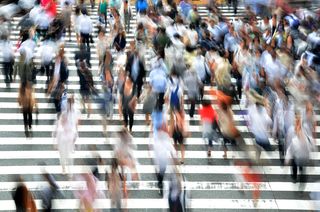Mindfulness
Slower Really is Faster: Mindfulness and “Habit Energy”
If you spend most of your day rushing around, this post is for you.
Posted April 12, 2019 Reviewed by Lybi Ma

My mindfulness practice has helped me when I get too disgruntled or stuck in Everyday mode of being (caught up in life's daily hassles), unable to access my Ontological mode (the preciousness of life). My mindfulness practice has enabled me to observe and curtail the habitual and powerful pulls that blindly suck me in every now and then.
One of the most well-known Buddhist monks is the prolific Vietnamese author and peace activist Thich Nhat Hanh. His life-long efforts of fostering peace throughout the world moved Dr. Martin Luther King to nominate him for the Nobel Peace Prize in 1967. In one of his over 80 best-selling books, Savor, about mindful eating, he introduces one of his observations from visiting the United States. He noticed most people tend to live with a lot of Habit Energy. It immediately piqued my interest. What is "Habit Energy"? Here’s an embarrassing personal example.
Five months ago (okay fine, five days ago), I was unable to print a short document due to technological difficulties. I am mortified to admit that because I was rushed, I yelled aloud in frustration alone in my apartment. It's a good thing no one else was around to hear me. It was one of those moments I wanted to take to my grave (too late for that). Two minutes felt like way too long to try to print something and I was in a rush to get on to the next thing in my busy day. This is how many of us live. When I pause and replay what had happened, why was I yelling at a printer? It was because I was stuck in the Habit Energy rampant in our society that emphasizes productivity and consumerism.
Don't get me wrong; sometimes we just need to rush. At certain times it can even be wise to rush. However, how often do you find yourself rushing through a task when you actually have plenty of time? Perhaps on the way to the store on a Saturday, with no other discrete plans after? What were you rushing about? Habit Energy is precisely that potent force that yanks us through life, propelling us to rush through most of our activities in order to get to the next one, often when there's no rush at all. More time is better, right? Heck, more of anything is always better! I know what you’re up to, Mr. Capitalist Influence! All about productivity and profit.
The force of Habit Energy is so unwavering because we tend to be unaware of it and often feel powerless to change it. Similar to the above example with the printer, Habit Energy is when we get annoyed and impatient when we need to wait two minutes in line to purchase our lunch. It's when we feel irritated that our friend arrived 10 minutes late instead of just relaxing and doing something else with our time. It's when you're fuming at the person in the car in front of you for not advancing their car immediately when the traffic light turns green. Three seconds is WAY too long to be waiting, right?!
These moments can be bells of mindfulness. We don't realize we can enjoy these pauses to appreciate life and let all our blessings sink into consciousness instead of rushing just trying to "kill time." Yes, I see you at the red light checking your phone even though there's nothing you need to check. What a phrase, "killing time!" Time is one of our key allies! It's life itself! As Hanh illuminated:
"We are always running and rushing. It has become a habit, the norm of everyday living. We run all the time, during our sleep, the time we are supposed to be resting and regenerating our bodies. We can be worst enemies, in conflict with ourselves, and therefore, you can easily start conflict with others..."
As Hanh suggested, what the heck is the rush? Is this how we're going to live until we die? Are we going to be “resting in peace” only when our dead bodies are buried in cemeteries? Is our Habit Energy exhausting us, making us run all over the place, rushing everywhere? Is this really a desirable life? Is this how you'll want to have lived when you're in your last days, looking back at your life? If peace and happiness are such sought-after traits—and you’re likely reading this because they are for you—what are we doing to ourselves with all the rush?
This post is your gentle reminder to slow down, as our lives are too precious to rush through. Mindfulness practice can help with this. If you're not into meditation, Dr. Stephen Hayes, creator of the mindfulness-based acceptance and commitment therapy (ACT) suggests that merely slowing down the activities of your daily life periodically can also help.
I don't know about you all, but I rarely enjoy activities I rush through. I likewise rarely produce anything of quality when I'm rushing. That's not life or happiness. Rushing through tasks stymies enjoyment, pleasure, and possibly creativity too. It also makes us even less productive. How do you feel when people try to rush an interaction with you or rush through sex with you? Have you tuned in to the look in your child's eye when they sense you're rushing through your interaction with them? Odds are, if you did, you would drop everything. Doing things slowly, mindfully, and ontologically is how the tortoise beat the hare. It seems like we haven't really learned from this fable as a capitalist, consumerist culture that places productivity above all else.
The sobering truth is that whether or not we are healthy and young, we are dying every day. In fact, the only true certainty is that we all will die. Every breath inevitably shepherds us to our impending demise. This isn't meant to discourage you, but to inspire you to slow down and be present with what you're doing, to connect with the miracle of your life. Rarely can you do this when you speed through things. Why not live this moment as fully as possible, while we still can? If you're thinking this is depressing, it is the exact opposite. It is a call to live life like it matters like it’s precious; fleetingly precious.
While it's easier said than done, doing the tasks of our daily lives slower and more mindfully is a practice that can add ages to our lives. You don’t always have to sit quietly to practice mindfulness. You can start with brushing your teeth and doing the laundry with more attention and care, feeling each thrust, back and forth, as you scrape the grime from your molars.
For a more formal practice, Hanh recommends a few breathing practices that can slow us down and release our Habit Energy. Among my favorites is the practice of gently repeating to ourselves as we breathe in, "Slow," and as we exhale, "Release." Other variations include "calming," on the in-breath and "savoring," on the exhale. For children, it can be as basic as inhaling "slow," to life, and exhaling "down" to life. It isn't about the words, however, but noticing the calm sensations in the bodies as the habit energy releases. The words themselves are just scaffolding, not meant to be the main focus. (Here's another highly recommended related meditation for helping the mind and body slow down.) It's great to help realize that by slowing the the breath, it can regulate the nervous system and heart-rate. Don't forget that we want them to be belly breaths so the oxygen goes all the way in to calm us.
The good news is that the more you become aware of your Habit Energy and the automatic conditioning fueling it that impels you to rush through everything, the less power it has over you; the more you can intentionally decide your pace. When I notice the pull, the entitled expectation for immediate gratification, I can pause and just notice it, before I act on it, directly hijacking the Habit Energy. Mindfulness practice directly cultivates this capacity.
Given how uneasy, stressed, and rushed we often feel, learning to slow down and release Habit Energy can be a sort of super-power. That’s the power of mindfulness—the freedom to pause and savor your life, the only life you have. What could possibly be more important in our abnormally fast-paced lifestyle?
*This post is for educational purposes and should not substitute for psychotherapy with a qualified professional.




